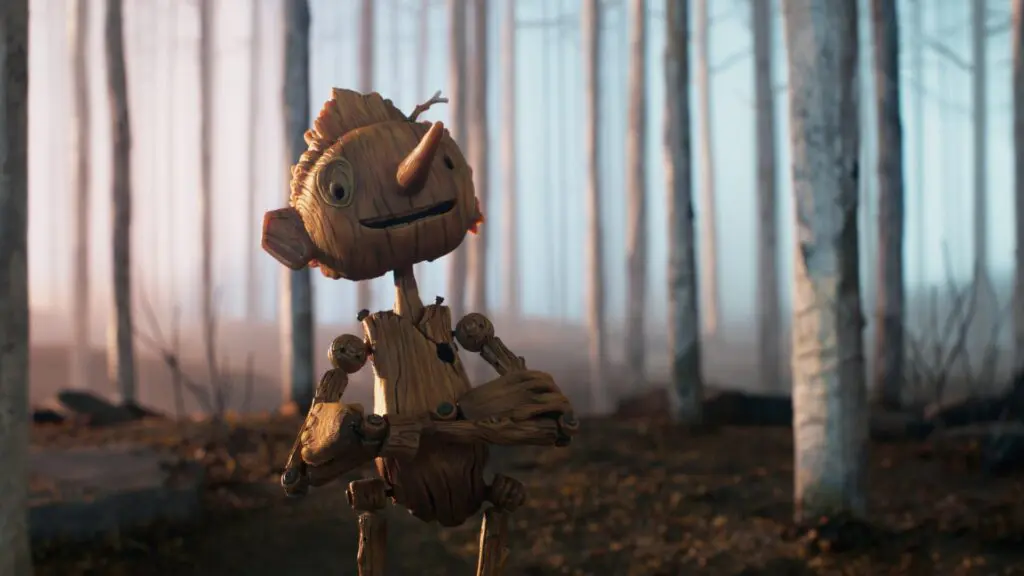Summary
Guillermo del Toro’s Pinocchio is courageous and refreshing filmmaking because the filmmaker always makes the bold choice without fear. A family film that continues to go through its own existential crisis, like the world we live in today, that is bittersweet, full of heart, and offers something beautifully hopeful.
Suppose you had to stand the Disney+ Pinocchio against Guillermo del Toro’s Pinocchio on Netflix. In that case, you’d think this was the aforementioned film on your right while the Pan’s Labyrinth‘s vision is bellowing evil laughs on your left. However, looks are deceiving as del Toro’s adaptation is the “Disneyfied” one. This is as close to Carlo Collodi’s vision as any filmmaker has ever gotten. The streaming giant’s version tells a story of a wooden boy trying to be human, which is challenging in an obscenely inhumane world. This animated adventure of the mischievous wooden marionette is dark, bleak, and still beautifully hopeful.
Taking place in the heart of the “fatherland” of Mussolini’s Italy, Geppetto (David Bradley) is restoring a church as his Carlo (Gregory Mann, who also voices the Pinocchio) asks a curious question about the world. In the distance, the older man hears planes, and as he goes out to look into the ominous sky, a lone bomb is dropped that falls into the church he made beautiful again. And kills Carlo in the process.
Devastated and grief-stricken, he buries the boy’s body, and a tree springs eternal from the ground where his grave lies. Geppetto takes the wood and carves a wooden marionette in Carlo’s place during an alcohol-infused haunting rage. All comes from his deep depression, and he ruminates about the loss. Then, the lifeless, not-at-all-artful log springs to life with the help of a wooden sprite (Tilda Swinton). Of course, Geppetto is thrilled but becomes a worried parent. Even if his distraught and unvarnished features are ones only a parent could love, he has helped. That includes Sebastian, the Talking Cricket (Ewan McGregor). Where did he come from? He was sleeping in Carlo’s tree at the time. He now has the thankless job of being the boy’s guardian angel.
Guillermo del Toro has truly reinvented a fairy tale that has been watered down and given Prozac since Walt’s studio had a stranglehold on all of them for the past two centuries. This version finds the darkness’s sweet spot while still fitting under the PG rating. Watch Pinocchio be hardened to a world under fascist rule. (The short bald guy even makes an appearance). He is full of life as he dips his toe into forceable suppression. Not to mention, he is technically a child who is quickly looked to be exploited. Like a creepy Count (Christoph Waltz) with a pet monkey (Cate Blanchett) looking to make a buck. Or the local Podesta (Ron Perlman), who sees a weapon that cannot die (or has a handful of life so he can come back to life), making him the ultimate tool in the Royal Italian Army’s holster.
The animation is masterfully done, as the stop-motion special effects are jaw-dropping. It’s incredible watching these animated objects become full of life yet have the look and feel as if they are so tangible, they can be touched. It’s the perfect marriage of special effects-laden animation with a story that weaves in themes that are anti-studio in spirit and embraces Hollywood technology. At the same time, it highlights del Toro’s classic themes of ominous metaphors of navigating an endless maze of depression and grief.
Guillermo del Toro’s Pinocchio is courageous and refreshing filmmaking because the script by the director and scribe Patrick McHale always makes the bold choice while always finding a way out of any difficult situation. A family film that continues to go through its own existential crisis, like the world we live in today, that is bittersweet, full of heart, and offers a hopeful light at the end of its ominous tunnel.
Read More: Guillermo del Toro’s Pinocchio Ending Explained




